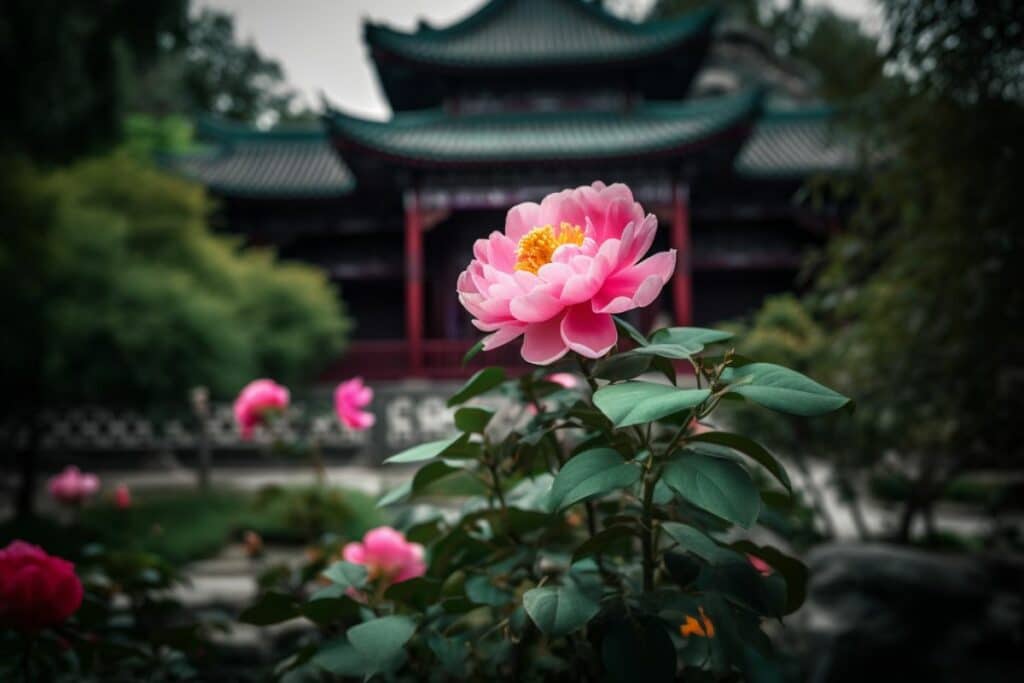
Imagine yourself surrounded by the captivating beauty of China Rose, an exotic and exquisite flowering plant that can bring a touch of tropical paradise right into your home.
As you delve into the world of this remarkable bloom, you’ll find that it not only offers stunning visual appeal but also holds a rich cultural significance.
With its vibrant colors and intricate flower structure, Hibiscus rosa sinensis has become a symbol of everything exotic and enchanting.
In this comprehensive guide, we will walk you through everything you need to know about China Rose – from planting and repotting to proper watering techniques, pruning, fertilization, and common issues.
So get ready to embark on an exciting journey as we explore the ins and outs of nurturing this incredible plant to ensure it thrives in your care.
You’ll soon discover how rewarding it can be to cultivate such an alluring piece of nature’s artistry within your own living space, so pull up your patio cushions and let’s talk about China rose.
All About China Rose
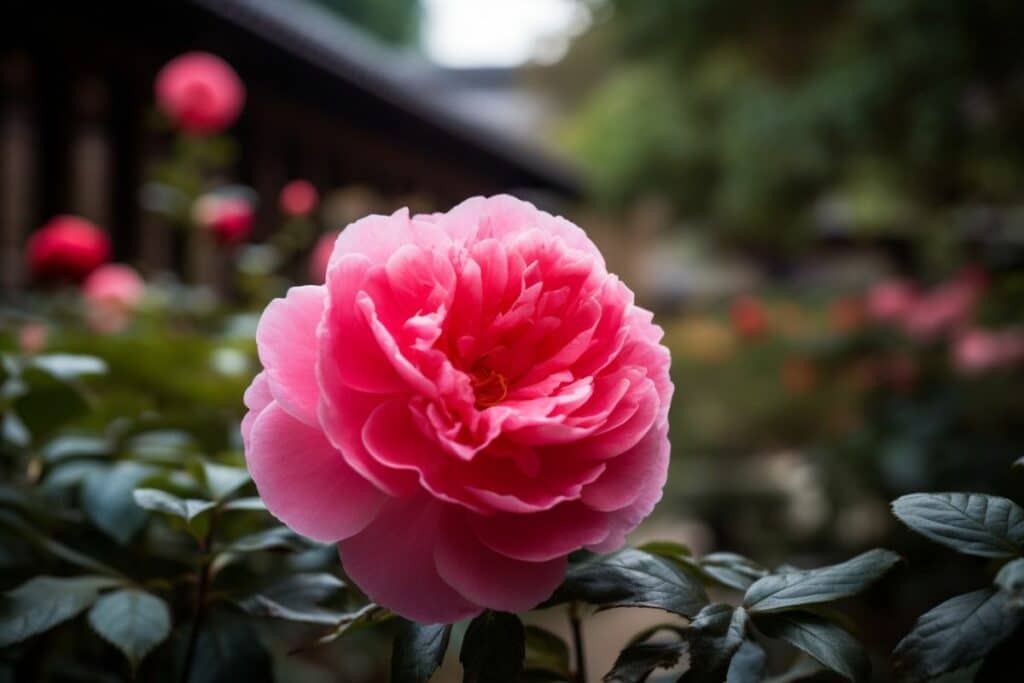
If you’re fascinated by exotic plants, the China rose is an excellent choice, as it can reach up to 13 feet in its natural environment and offers stunning blooms from March to November.
Also known as Hibiscus rosa-sinensis or Rosa chinensis, this captivating plant belongs to the Malvaceae family and is native to tropical regions.
The China rose features glossy dark green leaves and large flowers that come in a variety of colors, such as red, pink, yellow, orange, or even multicolored varieties. It thrives in well-lit conditions but can also grow in partial shade.
To ensure a healthy and vibrant China rose plant at home or in your garden, be sure to provide proper care throughout the year.
This includes repotting in the spring with a mix of healthy soil for optimal growth; pruning delicately and regularly removing wilted flowers (deadheading) to encourage more flower buds; fertilizing during the growth phase with flower plant fertilizer; and watering according to seasonal needs—more frequently in warmer months while reducing water input during cooler periods.
BioAdvanced 2-In-1 Systemic Rose

Perfect for China Roses
Feeds roses and flowers to promote strong and beautiful blooms
- 8 WEEK PROTECTION
- INSECT KILLER
- RAINPROOF PROTECTION
- TREATS 40 ROSES
Watch for common issues like aphids, scale insects, or excessive air dryness that could lead to problems such as leaves dropping off unexpectedly.
Caring for your China rose requires paying attention not only to its basic needs but also understanding how small changes may affect its overall health.
By providing adequate sunlight exposure without scorching its leaves; choosing a balanced mix of garden soil, soil mix, and heath when planting outdoors; sheltering it from strong winds; addressing pests early on; and adjusting watering habits based on temperature fluctuations—you’ll foster a thriving environment where your China rose can flourish.
With proper care and dedication, you’ll be rewarded with an exotic beauty that will captivate all who lay eyes on it—and perhaps inspire others around you to embrace their own subconscious desire to understand nature’s wonders through gardening!
Planting and Repotting
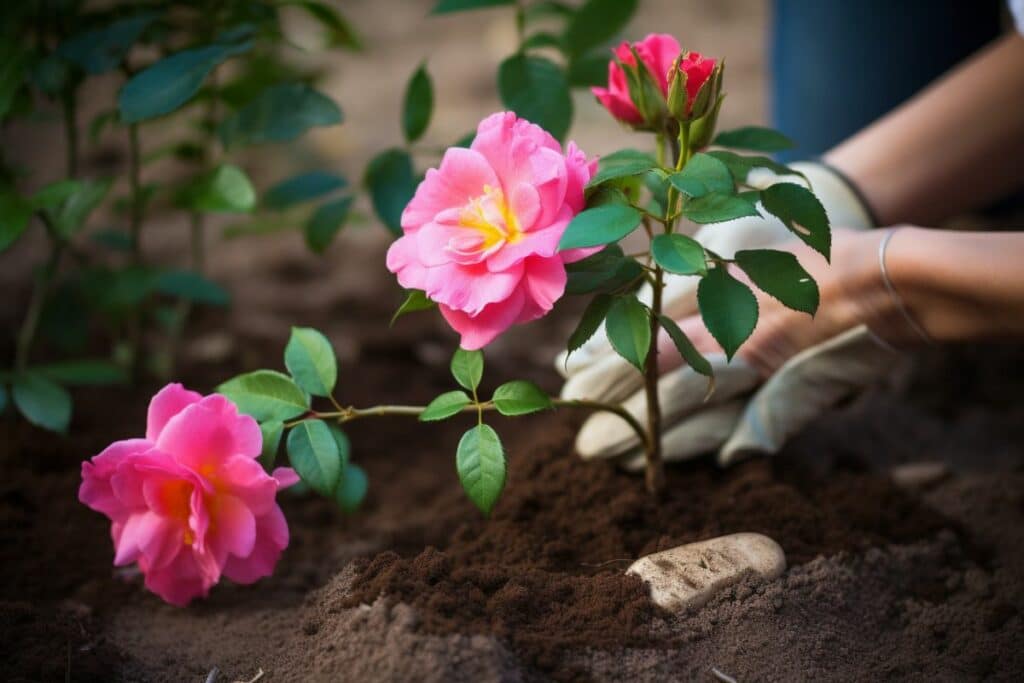
When it comes to planting and repotting your lovely china rose, there are a few essential tips and tricks that’ll make the process a breeze!
First and foremost, choose a well-lit spot for your plant, as china roses thrive in direct sunlight. However, be cautious of excessive heat or strong sun exposure, as this could lead to the withering of leaves. For outdoor planting, select a sun-bathed area sheltered from stronger winds.
Combine garden soil, soil mix, and heath when planting outdoors to provide optimal growing conditions for your china rose.
Repotting is typically performed in March when your china rose has outgrown its current pot. To start the process, choose a pot slightly larger than the previous one to accommodate growth. Place gravel or clay beads at the bottom of the pot for proper drainage – you don’t want those roots drowning!
Next, prepare a mixture of one part soil mix and one part heath, as this provides an ideal environment for root development. Be gentle when handling your china rose during repotting; delicately rearrange any roots that may have become tangled while transferring them into their new home.
You can also display your repotted flower on a wooden potting bench. This way, you can easily position it where you need to and enjoy it closer.
Watering is another critical aspect of successfully planting and repotting your china rose. In spring and summer months, water once or twice a week – but be mindful not to overwater! Allow the soil surface to dry off between watering sessions so that excess moisture doesn’t cause root rot or other issues like unexpected leaf drop-off.
During fall and winter months, reduce water input according to ambient temperatures since lower temperatures will slow down the plant’s water consumption rate.
By following these simple yet effective tips on planting and repotting, your beautiful China Rose plant can flourish indoors or outdoors in mild climates – adding an exotic touch wherever it may grow!
Proper Watering Techniques
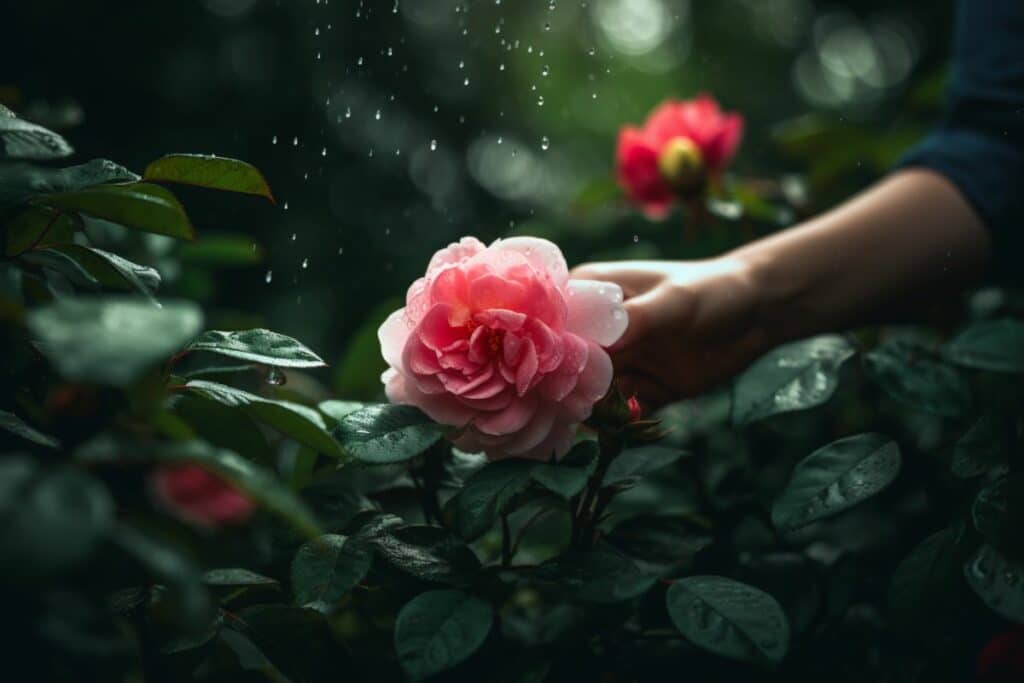
Proper watering techniques are crucial for keeping your china rose healthy and vibrant, so don’t worry. We’ve got the scoop on how to quench this exotic beauty’s thirst without drowning its roots or encouraging unwanted issues!
Since China roses prefer evenly moist soil but not standing water, it’s essential to strike a balance between providing enough moisture without overdoing it. Here are some key factors to consider when watering your China rose:
- Drainage: Make sure your pot has adequate drainage holes at the bottom, and use gravel or clay beads in the base of the pot. This will help prevent excess water from pooling around the roots, which can cause rot.
- Frequency: Water your China rose once or twice a week during spring and summer months when temperatures are warmer. In fall and winter, reduce water input to match ambient temperatures.
- Moisture check: Before watering again, let the top layer of soil dry out slightly by sticking your finger about an inch into the soil; if it feels dry at that depth, it’s time to give your plant a drink.
- Watering method: Water slowly and deeply at the base of the plant rather than over its leaves; this prevents fungal growth on foliage caused by excessive moisture.
- Monitoring: Keep an eye out for signs such as wilting leaves (which could indicate too much heat or sun exposure) or unexpected leaf drops due to excess water.
Remember that proper watering techniques for your China rose aren’t just about following a rigid schedule – they involve being attentive to your plant’s specific needs according to environmental factors such as seasonality and temperature shifts.
By monitoring changes in these factors and adjusting accordingly, you can provide just-right amounts of moisture that’ll keep those stunning blooms coming back year after year.
So go ahead – give those china roses some H2O TLC! With careful attention to drainage, frequency, moisture levels, and watering methods, you’ll be well on your way to nurturing a happy, healthy, and gorgeous China rose.
And when those exotic blooms start bursting forth in all their glory, you’ll know that your efforts have truly paid off!
Pruning and Fertilization
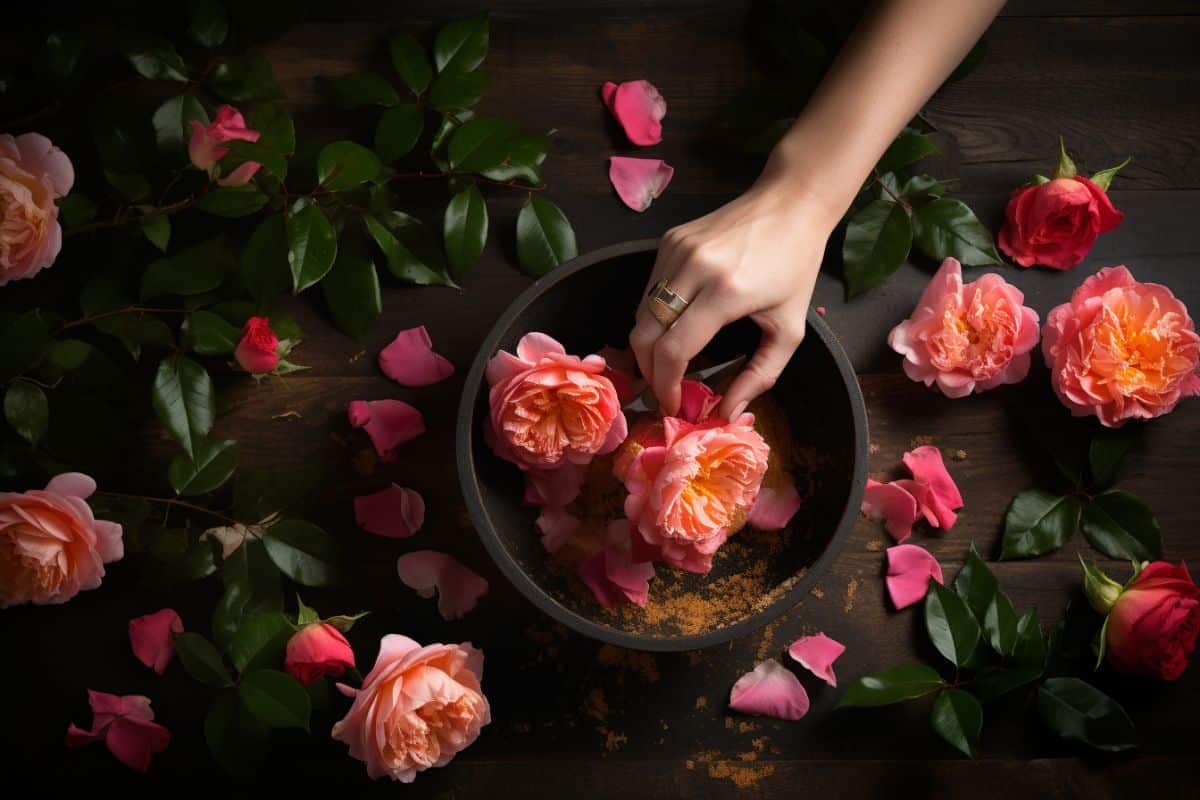
Time to grab those pruning shears and whip out the fertilizer – let’s dive into keeping your China rose in top shape through proper pruning and nourishment!
Pruning is essential for maintaining a well-shaped plant with strong branches, while fertilization ensures that your rosa has all the necessary nutrients for optimal growth and flowering.
The best time to prune your China rose is in March, as this allows you to delicately remodel its silhouette before it enters its growth phase.
When pruning your China rose, focus on removing dead or damaged branches and any overcrowded or crossing stems. This will help promote air circulation and prevent diseases from spreading throughout the plant.
Additionally, be sure to remove wilted flowers regularly (also known as deadheading) – doing so not only keeps your plant looking tidy but also encourages further blooming.
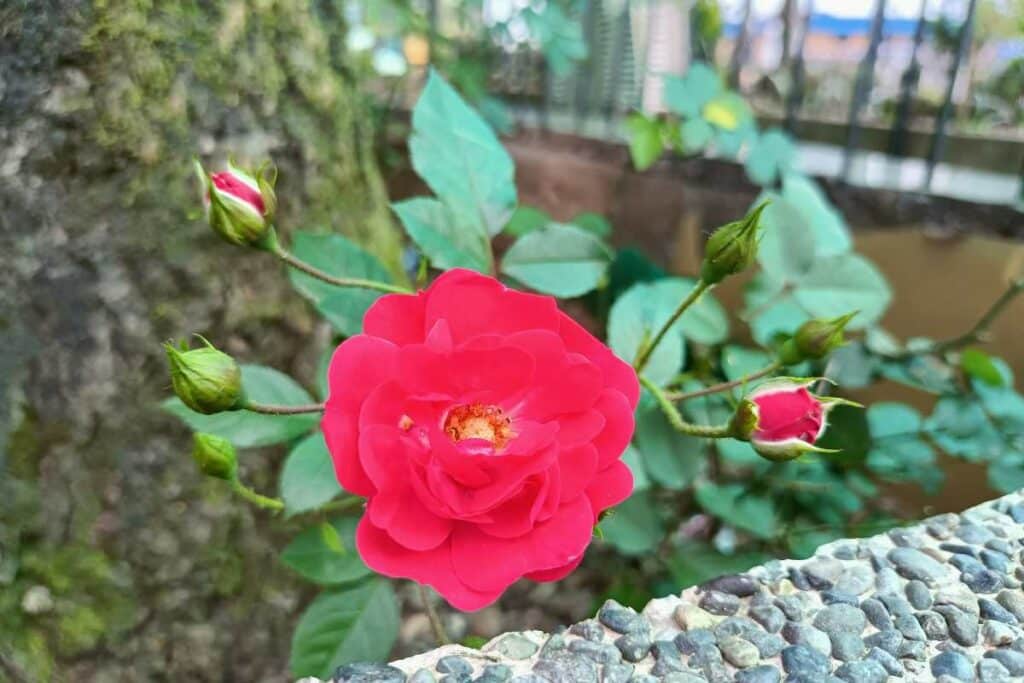
As for fertilization, adding a flower plant fertilizer during the growth phase will provide your China rose with essential nutrients that promote vibrant blooms and healthy foliage. To apply fertilizer properly, follow the instructions on the packaging regarding recommended dosage and frequency.
It’s important not to over-fertilize, as this can cause more harm than good by leading to an excess of salts in the soil, which can damage roots or create nutrient imbalances.
Also, keep in mind that watering practices play a crucial role in ensuring proper nutrient uptake; make sure you’re adjusting water input according to ambient temperatures and allowing soil to dry out between waterings.
With regular pruning and just-right fertilization combined with other care practices mentioned above, you’ll have a flourishing China rose that showcases its exotic beauty year after year!
Common Issues and Solutions
Caring for your beloved Chinese hibiscus can be a breeze, but it’s essential to watch for common issues and learn how to tackle them gracefully.
One such issue is when the China rose leaves wither due to excess heat or strong sun exposure. To prevent this, make sure your plant is placed in a well-lit area but not directly exposed to harsh sunlight.
If you notice that the leaves are sticky and pasty with tiny insects invading, you’re likely dealing with an aphid attack. A simple solution would be to spray water mixed with black soap on the affected areas; this will help eliminate the aphids without harming the plant.
Another problem you might encounter is when flower buds fall off before blooming, usually caused by excessive air dryness.
To address this concern, maintain proper humidity levels around your China rose by placing a tray filled with water and pebbles beneath the pot or using a humidifier in your living space.
You should also keep an eye out for scale insects, which leave behind a white cottony residue on the leaves. To remove these pests from your precious plant, use rubbing alcohol on a cotton swab and gently wipe away any visible scale insects.
One more common issue faced by China rose enthusiasts is unexpected leaf drops, often resulting from excess water in the soil. To avoid this problem, ensure that you’re not overwatering your plant – let the ground dry off before watering again and provide good drainage at the bottom of its pot.
By following these solutions and closely monitoring your hibiscus’ health, you’ll have better success in maintaining its vibrant beauty while preventing diseases from wreaking havoc on your beloved exotic symbol of all things tropical!
Outdoor Planting Considerations

Now that you’re familiar with some common issues and their solutions let’s dive into the specifics of outdoor planting for your China rose. Growing these beautiful plants outdoors can be rewarding, but it requires careful consideration of various factors to ensure a healthy and thriving plant.
In this section, we’ll discuss important aspects to consider when planting China rose outside.
- Location: Choose an area in your garden that receives full sun and is sheltered from strong winds. China roses need plenty of sunlight to grow well.
- Soil: Plant your China rose in a mix of garden soil, soil mix, and heath to provide the right amount of nutrients and drainage.
- Climate: Pay attention to temperature changes in your area as these plants are sensitive to freezing temperatures. If you live in a region where it frequently freezes, consider planting a different hibiscus variety such as althea or rose mallow instead.
- Watering: Ensure proper watering when growing outdoors; similar to indoor care, allow the ground to dry off before watering again.
Remember that while outdoor planting can be successful under certain conditions, China roses are primarily grown as indoor plants in regions where freezing temperatures occur regularly during the winter months.
By following these guidelines on location selection, soil preparation, climate awareness, and watering habits, you will not only increase the likelihood of success when growing your china rose outdoors but also maintain its exotic beauty all year round.
So go ahead and give outdoor planting a try if you live in an appropriate climate! With adequate attention paid to each aspect mentioned above – from selecting the perfect sun-filled spot for your plant’s new home down to maintaining proper water levels – there’s no reason why you won’t end up with a flourishing china rose to adorn your garden space for everyone around you (and yourself) to enjoy!
To make the environment of your garden even more inviting, consider adding wind chimes to a few nearby trees.
Conclusion
You’ve now got the knowledge to properly care for your China Rose and help it thrive. Embrace this exotic flower’s beauty and enjoy its captivating presence in your home or garden.
Remember, with proper exposure, watering, pruning, and fertilization. Your plant can grow up to 13 feet tall outdoors!
Did you know that there are over 200 species of hibiscus plants? That’s a testament to their adaptability and popularity around the world.
Take pride in being a part of this global community cultivating these stunning flowers. Next, learn about all the different kinds of thornless roses.


